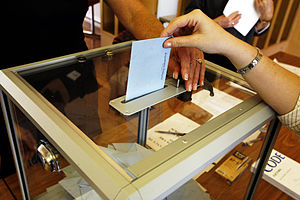Universal suffrage (also universal adult suffrage, general suffrage or common suffrage) consists of the extension of the right to vote to adult citizens (or subjects), though it may also mean extending that right to minors (Demeny voting) and non-citizens. Although suffrage has two necessary components, the right to vote and opportunities to vote, the term universal suffrage is associated only with the right to vote and ignores the frequency that an incumbent government consults the electorate. Where universal suffrage exists, the right to vote is not restricted by race, sex, belief, wealth, or social status.In 1893 New Zealand became the first nation in the world to grant universal, male and female adult suffrage. Historically, however, universal suffrage usually referred to adult male suffrage. France was the first nation that announced universal [male] suffrage; it had the first national system that abolished all property requirements as a prerequisite for allowing men to register and vote. Republican France first instituted full male suffrage in 1792. France and Switzerland have recognized full male suffrage continuously since 1848 (for resident male citizens). The German Empire implemented full male suffrage from 1871.In most countries, full universal suffrage followed about 10 to 20 years after full male suffrage. Notable exceptions in Europe were France, where women could not vote until 1945, Italy (1946), Belgium (1948), and Switzerland (1971 in federal elections and 1990 in all cantonal elections).In the first modern democracies, governments restricted the vote to those with property and wealth, which almost always meant a minority of the male population. In some jurisdictions, other restrictions existed, such as requiring voters to practice a given religion. In all modern democracies, the number of people who could vote has increased progressively with time. In the 19th century in Europe, Great Britain and North America, there were movements advocating "universal [male] suffrage". The democratic movement of the late 19th century, unifying liberals and social democrats, particularly in northern Europe, used the slogan Equal and Common Suffrage.Universal suffrage requires the right to vote to be granted to all citizens. Some countries, however, do not allow certain categories of citizens to vote. This includes felony disenfranchisement and disfranchisement based on resident status.




Comment
0